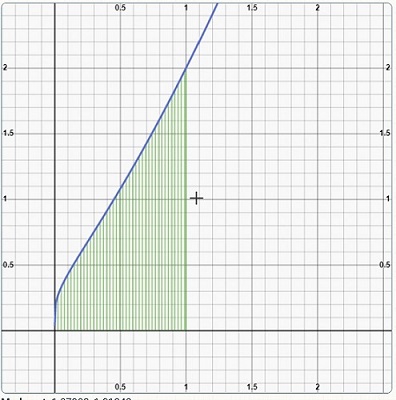Worked Solution using Feynman's Technique
To provide a better understanding of how Feynman's technique, here is another example. Let this function:
The graph of this function looks like this:

The antiderivative of this function may turn out to be ugly as it involves solving with the exponential and logarithmic integral, but this function can be solved easily if we using differentiation under the integral sign. Therefore, let's define a more basic function:
With this function, our goal is to simplify this function and get a value for F(2) which in turn gives us the answer to the question that was posed. Let's take the derivative of F(b):
According to Feynman's rule, $ \frac{d}{dx}\int_{a}^{b} f(x,y) dx $ = $ \int_{a}^{b} \frac{\partial f(x,y)}{\partial x} dx $
Hence, $ \frac{d}{db}\int_{0}^{1}\frac{x^b-1}{ln(x)} dx $ = $ \int_{0}^{1} \frac{\partial}{\partial b} \frac{x^b-1}{ln(x)} dx $
When we hold $ x $ constant and the derivative with respect to $ b $, you will get $ \frac {d}{db} (x^b) = x^bln(x) $ and hence,
To answer our question, we now need to integrate the above to get F(b) and in doing so, we get
To find the value for $ C $, if we look carefully at the defined function F(b), we see that when b = 0, F(0) = 0 and when we plug it back to the above equation we get $ ln(0+1) + C $, giving us $ C = 0 $
Now to find our desired answer, which is F(2), we can simply plug the value of 2 into the function of F(b) after using Feynman's technique and see that

